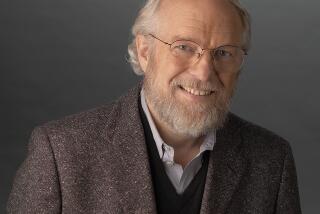Ex-Hacker Ready for Next Step
- Share via
Steve Jobs’ return to Apple Computer is more than just a morality tale about the prodigal son. It’s an illustration of how technological innovation really works.
It’s easy to tell stories about technology in terms of powerful forces like microprocessors, MIPS and money. But, far more than is usually admitted, innovation depends on individuals, their serendipitous history and the connections between them.
This is true at all levels of industry, not just in corporate boardrooms. Take, for example, a typically untypical software developer like Bruce Fancher. A 25-year-old New York entrepreneur, Fancher finds himself perfectly poised to take advantage of Apple’s acquisition of Next Software Inc., the company Jobs launched after being ousted from Apple in 1985.
But the story of how Fancher ended up that way is a story of random chance and seemingly bad decisions. First off, he started in the trash. “I got a modem when I turned 14 and I entered this world that seemed really dangerous and amazing,” Fancher says. “We’d go down to the Nynex central office and dig up old manuals and printouts that had been discarded.”
From this detritus, Fancher and friends were able to figure out how to use Bell computers to do everything from make free phone calls to listen in on people’s lines. In short, Fancher became a hacker.
The experience taught him a lot more than just how to be a criminal. In order to exploit the things he was learning from food-stained paper, Fancher was forced to understand the intricacies of assembly language programming and the Unix operating system as well as the rudiments of computer networking. These were skills that his high school didn’t come close to teaching, and that made even his college introduction to computer science seem deathly dull.
So dull, in fact, that in 1991 when one of Fancher’s friends came up with the harebrained scheme of dropping out of college to start some kind of computer business, he jumped at the chance.
With his tuition money and a student ID that had yet to be canceled, Fancher bought a computer that seemed to belong to the promised future: a Next cube. Thanks to academic pricing, $7,000 was enough to get him a complete system capable of running Unix and a handful of applications.
Fancher immediately became a Next zealot, proselytizing about the machine to his parents and his friends, and he began to write his own applications. “What the Mac did for users, Next did for programmers,” Fancher still insists. “I was five to 10 times more productive than I would have been on the Mac or with Microsoft.”
Remembering his days in the computer underground, where hackers would trade information over electronic bulletin board systems, and believing the pronouncements coming out of D.C. about the information superhighway, Fancher decided to start his own electronic community. He cobbled together some BBS software for the Next, got a low-speed connection to the Internet and opened for business.
The reaction to his system, called Mindvox, was immediate and overwhelming. Remember, this was before Mosaic and the Web; the Internet was still an esoteric place populated largely by scientists. But now Fancher had put e-mail and net news within the range of New York hobbyists. He had become one of New York’s first Internet service providers.
Pioneering is never easy, and Fancher found himself relying on the exploratory spirit of his hacker days to keep things running. Usually this just meant digging around for answers instead of hoping to find them in a manual, but sometimes the connection was less subtle.
Like every business in New York, Fancher often found himself butting heads with Nynex, the local telephone company. One time in particular he nearly tore his hair out because he had ordered 15 new phone lines for Mindvox but Nynex kept screwing up the order.
Finally, in desperation, he put the knowledge he had gained in high school to work: He called up the local switching center at 2 a.m. on a Saturday (“That’s when the dumbest guy in the department works”) and pretended to be a supervisor at another office. Patiently, Fancher walked the employee through the commands that had to be entered into the console, and 20 minutes later he had his phone lines.
Despite successes like this, the Internet service provider marketplace was becoming increasingly inhospitable by 1995. “There was just too much competition,” Fancher says. “Internet access had become a commodity business, and it was being offered by every computer store in New York with a back room.”
Fortuitously, an escape hatch appeared in the guise of the Dutch telephone company. It approached Fancher and his team about developing a custom Internet access solution. The resulting money infusion was enough to allow Fancher’s company to largely turn its back on Mindvox and concentrate instead on custom software development. Not only was the money better, Fancher says, but it was a whole lot easier pleasing one customer instead of thousands.
It was also a chance for Fancher to concentrate on his first love: Next. Although Next was no longer making hardware, its NextStep operating system had been ported to run on Sun workstations. And Next had introduced something called WebObjects, a software tool that made it very easy to hook Web pages up to databases.
“Thanks to WebObjects,” Fancher says, “we were able to build up a nice consulting business and raise our rates to $250 an hour.” Still, it was an admittedly niche market. Most companies wanted nothing to do with a dead operating system like NextStep.
That, of course, all changed last month with Apple’s announcement that NextStep will become the Macintosh’s new operating system. Suddenly, Fancher’s niche is looking mainstream. What was once just a fantasy--building mass-market desktop applications using the advanced development system of Next--suddenly looks feasible. Who could have predicted?
Looking back, Fancher sees little he would have done differently. “It might have helped to have a little more business experience and less on-the-job trial and error,” he says. “But technically I think I learned just the right stuff.”






